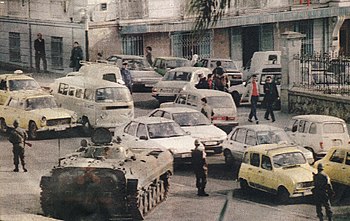Algerian Civil War
| Algerian Civil War | |||||||
|---|---|---|---|---|---|---|---|
 Military deployed in the streets of Algiers, after the military coup against the Islamists, who took up arms later. |
|||||||
|
|||||||
| Belligerents | |||||||
|
|||||||
| Commanders and leaders | |||||||
|
|
Djamel Zitouni Antar Zouabri |
||||||
| Strength | |||||||
| 140,000 (1994) 124,000 (in 2001) |
2,000 (1992) 40,000 (1994) 10,000 (1996) 300–1,000 (2005) |
||||||
| Casualties and losses | |||||||
| 44,000–150,000 total dead | |||||||
The Algerian Civil War was an armed conflict between the Algerian Government and various Islamic rebel groups which began in 1991 following a coup negating an Islamist electoral victory. The war began slowly as it first appeared the government had successfully crushed the Islamist movement, but armed groups emerged to fight jihad and by 1994-5 violence reached such a level that it appeared the government might not be able to withstand it. By 1996-7 however it became clear that the violence and predation of the Islamists had lost its popular support, although fighting continued for several years after.
The war has been referred to as 'The dirty war’ (la sale guerre), and saw extreme violence and brutality used against civilians. Islamists targeted journalists, over 70 of whom were killed, and foreigners, over 100 of whom were killed, although it is thought by many that security forces as well as Islamists were involved, as the government infiltrated the insurgents. Total fatalities have been estimated to be a range of different values from 44,000 to between 100,000 and 200,000.
The conflict began in December 1991, when the new and enormously popular Islamic Salvation Front (FIS) party appeared poised to defeat the ruling National Liberation Front (FLN) party in the national parliamentary elections. The elections were canceled after the first round and the military effectively took control of the government, forcing pro-reform president Chadli Bendjedid from office. After the FIS was banned and thousands of its members arrested, Islamist guerrillas rapidly emerged and began an armed campaign against the government and its supporters.
...
Wikipedia
